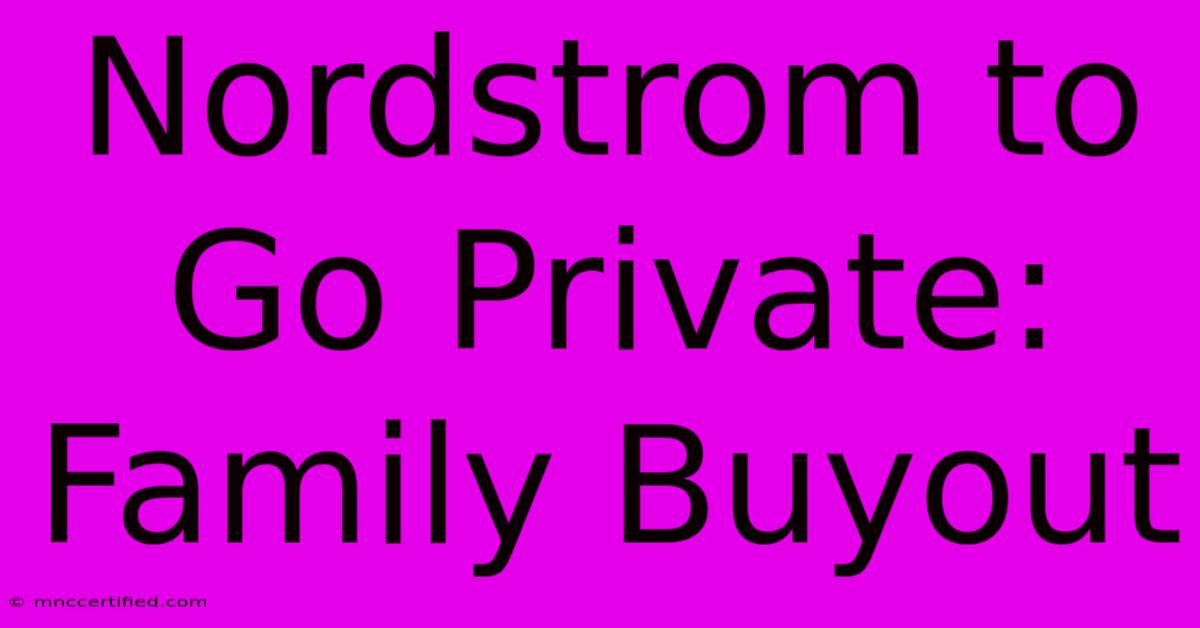Nordstrom To Go Private: Family Buyout

Table of Contents
Nordstrom to Go Private: Family Buyout Shakes Up Retail
The retail world is buzzing with the news: Nordstrom, the iconic department store chain, is going private. This significant move, spearheaded by the Nordstrom family, marks a major shift for the company and raises important questions about the future of brick-and-mortar retail. This article delves into the details of this family buyout, exploring its implications and analyzing its potential impact on the industry.
The Nordstrom Family's Buyout Bid: A Return to Private Ownership
After years of navigating the challenges of the evolving retail landscape, the Nordstrom family has launched a bid to take the company private. This isn't simply a change in ownership structure; it represents a strategic maneuver aimed at potentially revitalizing the brand and steering it towards a more sustainable future outside the pressures of public market scrutiny. The offer values the company at approximately [insert current valuation if available], a significant investment demonstrating the family's continued commitment to the Nordstrom legacy.
Key Players and the Buyout Structure:
The buyout involves a consortium led by members of the founding family, including [mention key family members involved]. The specifics of the deal are still emerging, but it's expected to involve a combination of equity contributions from the family and potentially debt financing. This private equity component will significantly impact the company's future financial flexibility and strategic decisions.
Why Go Private? Navigating the Challenges of Modern Retail
Nordstrom's decision to go private isn't a spontaneous one. It's a calculated response to a multitude of pressures impacting the department store sector:
-
E-commerce Competition: The rise of online retailers has significantly impacted brick-and-mortar stores like Nordstrom. The pressure to compete on price and convenience with online giants has squeezed profit margins. Going private allows for a longer-term strategic focus on e-commerce integration and a more agile response to market changes without the quarterly earnings pressures of a public company.
-
Shifting Consumer Preferences: Consumer preferences are evolving rapidly. Understanding these shifts and adapting quickly is crucial for survival. A private structure allows for greater flexibility in adjusting to these changing tastes and implementing innovative retail strategies.
-
Real Estate Optimization: Nordstrom's significant real estate holdings represent a substantial asset. Private ownership offers more freedom to restructure its portfolio, potentially closing underperforming locations and investing in more profitable spaces or new retail formats.
-
Long-Term Vision: Public companies often prioritize short-term gains. The Nordstrom family's buyout enables them to focus on a long-term vision, prioritizing sustainable growth and brand revitalization over immediate returns.
What Does This Mean for the Future of Nordstrom?
The transition to private ownership opens up exciting possibilities for Nordstrom. The family can implement bold strategies that might be too risky or time-consuming under public market scrutiny. This could include:
- Enhanced Omnichannel Experience: Investing heavily in improving online and in-store experiences, ensuring a seamless transition between the two.
- Strategic Acquisitions: Exploring strategic acquisitions of smaller brands or complementary businesses to diversify offerings.
- Supply Chain Optimization: Streamlining supply chain operations for greater efficiency and reduced costs.
- Brand Repositioning: Potentially repositioning the brand to better appeal to younger demographics or expand into new market segments.
Implications for the Broader Retail Landscape
Nordstrom's move to private ownership sends a ripple effect throughout the retail industry. It signals a growing trend of family-controlled businesses regaining control or private equity firms acquiring struggling retailers to reshape their strategies. This trend underscores the challenges and opportunities in the modern retail landscape and highlights the need for adaptability and strategic innovation.
Conclusion: A Gamble on the Future?
The Nordstrom family's buyout is a high-stakes gamble. While it carries inherent risks, it also presents the potential for significant rewards. The move demonstrates a strong belief in the Nordstrom brand and a willingness to embrace long-term strategies for success. Only time will tell if this bold decision will revitalize the company and secure its place in the ever-evolving retail landscape. The next chapter for Nordstrom promises to be fascinating to watch.
Keywords: Nordstrom, private equity, family buyout, retail, department store, e-commerce, omnichannel, consumer preferences, strategic acquisitions, supply chain, brand repositioning, public company, private company, retail industry, future of retail.

Thank you for visiting our website wich cover about Nordstrom To Go Private: Family Buyout. We hope the information provided has been useful to you. Feel free to contact us if you have any questions or need further assistance. See you next time and dont miss to bookmark.
Featured Posts
-
Nfl Draft Chargers 2025 Order Update
Dec 24, 2024
-
Ex Trump Pick Gaetz Faces Sex Charges
Dec 24, 2024
-
6 25 B Nordstrom Family Acquisition
Dec 24, 2024
-
Top 5 Primetime Moments 2024 Rewind
Dec 24, 2024
-
Red Sox Acquire Buehler
Dec 24, 2024